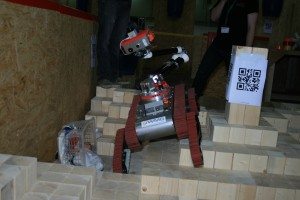Warwick students come second in international robot competition
A team of Warwick students have come second in an international robotics competition.
The eight undergraduates from Warwick Manufacturing Group (WMG) and Engineering also won two awards for their rescue robot at the European RoboCup Rescue Championship.
The team’s robot aims to access areas of danger in disasters to find trapped victims and inform rescuers of their location.
It can be remotely operated, has the ability to climb slopes, stairs and uneven terrain and has sens ors to detect things like body heat and carbon dioxide. There are also front and rear cameras to give the operator full visibility.
ors to detect things like body heat and carbon dioxide. There are also front and rear cameras to give the operator full visibility.
The awards for Best in Class for Mobility and Best in Class for Manipulation were presented at the four-day competition in Germany.
“I think it is a great achievement,” said project manager Kyle Blanch, “We have improved the performance of the robot in the competition.
“I feel particularly proud to be involved in such a recognised project, not least because we were the entrant from the UK and the other teams were made up of PhD students and researchers.”
The robot was put to the test in the competition. It had to find QR codes and hazard signs as well as plastic dolls which represented victims.
It took five years and five teams to develop the machine. Last year, the team won the mobility award but failed to complete the competition due to technical failures.
The team are supervised by Dr Emma Rushforth and Dr Peter Jones.
Rushforth said, “The students have worked hard on the project and spent a week of their Easter vacation in Germany for the competition. The most important thing is that they have learnt a lot and gained a good deal of experience.”
The project accounts for a quarter of the final year grade for each student.
Blanch described the work as both “enjoyable and stressful”. He added, “I believe we had a strong team ethic, particularly when it counted. It was a really good experience.”
Due to student examinations, the team are unable to attend the finals in June, held in Mexico.
Rushforth said a more investment is needed in rescue robotics: “The underlying reason for having these types of competitions is to push forward the technology so that ultimately it can be used in real disasters. Currently the technology is not reliable enough or adequate.
“The earthquakes in New Zealand the Fukushima nuclear incident in the wake of Japan’s earthquake highlight the need for such robot.”
Continuing participation in future years will depend on funding from the University and sponsors.
Other projects Warwick Mobile Robotics is working on include an autonomous lawn mower for golf courses, urban surveillance and development in cameras collision avoidance for cars.
Rushforth added, “Prior to rescue robots we did robot football but switched to rescue due to a lack of UK teams to play with!”
Comments